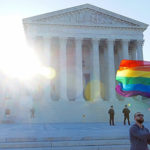Posted: 11/16/07
|
(Art by Andrew Garcia Philips/The Star-Ledger)
|
Neurotheology opens doors
for scientific study of belief
Hannah Elliott
Associated Baptist Press
NEW YORK (ABP)—Some scientists say neurotheology—an emerging discipline that addresses the correlation between neurological and spiritual activity—proves God created the brain. Others claim “the brain created the god.”
At the root of the debate, some say, is the threat that faith could be reduced to nothing more than chemical reactions in the brain.
The coupling of science and belief has become increasingly prominent in popular media. Time and Newsweek magazines both have run long stories exploring the newly recognized discipline. And current studies at Wheaton College, Columbia University and the University of Pennsylvania are using neuro-imaging to locate brain regions activated during emotional or spiritual events.
 |
| See Related Articles: • Have we gone too far in the race for parenthood? • Neurotheology opens doors for scientific study of belief • Consesus lacking on end-of-life issues • Ethicists in quandary over surrogacy • Hospital chaplains minister in the workplace |
The quest is to find a neurological basis for out-of-body or enlightenment experiences, including trances, time perception, oneness with the universe and altered states of consciousness. But neurotheology also can help explain the more mundane habits of a religious life—prayer, beliefs, meditation and senses of the presence of the supernatural.
Paul Simmons, a clinical professor of family and community medicine at the University of Louisville School of Medicine, said the brain is intimately related to relationships with and perceptions of God. So, neurotheology is a good way to help theologians use all of their capacities to study God.
Simmons, a former pastor and ethics professor at Southern Baptist Theological Seminary, insists the underlying question is whether that experience is “just a mental state, or have you gotten in touch with a transcendence?”
“Our brain is basic to all that we are, all that we understand, all that we perceive,” Simmons said. “We can’t avoid that in theology any longer. At least, we must be aware of the fact that many of our claims made about religion are actually based on science.”
Theories about correlations between the brain and beliefs are nothing new. Historians have speculated that figures like Joan of Arc, Saint Teresa of Avila, Fedor Dostoevsky and Marcel Proust had ailments like epilepsy, which in turn led to their obsessions with the spiritual world.
Beginning in the 1950s, scientists used electroencephalograms, or EEGs, to record electrical activity in the brain. By placing electrodes on the scalp, they could study brain waves concurring with elevated states of consciousness. In the 1980s, they stimulated different areas of the brain with a magnetic field, causing subjects to claim senses of ethereal presences in the room.
The first modern book published on the subject came in 1994. Called Neurotheology: Virtual Religion in the 21st Century, it was promoted in a theological journal called Zygon. And Newsweek recently citied a 1998 book—published by MIT Press, no less—called Zen and the Brain. Since then, scholarly journals have devoted issues to religion and the mind, including studies using data from meditating Buddhist monks and praying Franciscan nuns.
The reason for the renewed interest, according to neurotheology pioneer Brian Alston, is that the people writing about it have changed the terms of the field. This popular type of neurotheology focuses on beliefs, he said.
“In some ways, with neuroscience in pop culture, it sometimes seems more simple and basic than it really is,” said Alston, who is pursuing a doctorate in clinical psychology from Argosy University. “What bubbles up to the surface in culture may make it seem simple, but it’s not. It’s really complicated. … There’s still so much we don’t understand about the brain.”
Studies since the 1960s consistently have reported that between 30 percent and 40 percent of people have felt “very close to a powerful, spiritual force that seemed to lift you out of yourself,” Newsweek reported. According to the Gallup Poll, 53 percent of Americans say they have experienced a “sudden religious awakening or insight” at least once.
But has the fascination with the brain and belief come from an oversimplified version of neurotheology? Some have criticized Time’s article as equating science with Darwinism and religion with God—over-generalized definitions for such complex subjects.
“It’s oversimplified, but at the same time, there’s a large kernel of truth in there,” Simmons said. “The issue is whether a religious experience is a matter of brain circuits or God. Religiously inclined people will say, ‘Well, that’s God using our brain manifesting (itself) in brain activity.’“
Alston, who wrote What is Neurotheology?, said popular writing certainly has oversimplified the dialogue between science and theology. Theology does not just deal with the religious and the spiritual; it has much broader implications, he said.
Neurotheology should represent beliefs that are broader than just religious and spiritual, he added. It should represent cultural and political beliefs, as well.
“What neurotheology tries to do is say: ‘Look, here are ways that all this works together. Instead of seeing these things as enemies, let’s look at these as things that can relate,’“ he said.
Part of the issue, Alston added, is that, “in the Western world, we have created a dichotomy between what we consider to be physical and what we consider to be spiritual.”
That divide has been implicated in some of the criticisms of neurotheology. The key problem with neurotheology is its attempt to unify two strikingly different perspectives on human beings within one discipline, Alston wrote in a paper he presented to the American Psychological Association last year.
Massimo Pigliucci, a professor of ecology and evolution at the State University of New York at Stony Brook, has published essays questioning the discipline itself. In an essay titled “Neurotheology: A Rather Skeptical Perspective,” Pigliucci wrote he had two problems with neurotheology: “First, it is no theology at all. Theology is the study of the attributes of God. … The neurological study of what happens to the brain during mystical experiences cannot tell us anything about God because all we can do is to measure neural patterns.”
The other problem, Pigliucci wrote, is that it violates a basic rule of logic that what “can be done with fewer … is done in vain with more. That is, when faced with multiple hypotheses capable of explaining a given set of data, it is wise to start by considering the simplest ones, those that make the least unnecessary assumptions.”
That logic would leave God out of the equation.
Simmons called that criticism “on target.” Neurotheology doesn’t deal with theology as it traditionally is done—trying to get religion and experience together with reasonable consistency, he said. Progress in the field will come mostly in mental health, he said.
Alston, who studied ethics and philosophy at Yale Divinity School, says criticism of neurotheology depends on who is receiving the information. Much of it has to do with the difference between the physical brain and the metaphysical mind. Some experts believe ideas in the mind cause action, while others say chemicals in the brain cause action—and if chemicals are altered in the brain, behaviors will change, Alston said. Either way of thinking is OK, since neurotheologists aren’t interested in changing firmly held beliefs, he said.
“What I’m trying to do with neurotheology is to explain that each of these has a way with relating to the subject matter,” he said. “It once again depends on the standing point of a person in terms of if they’re a biologist and what their tools are and if they are a psychologist and what their tools are.”
And with the stakes so high in this new and complex discipline, there’s likely to be no shortage of opinions from either camp.














We seek to connect God’s story and God’s people around the world. To learn more about God’s story, click here.
Send comments and feedback to Eric Black, our editor. For comments to be published, please specify “letter to the editor.” Maximum length for publication is 300 words.